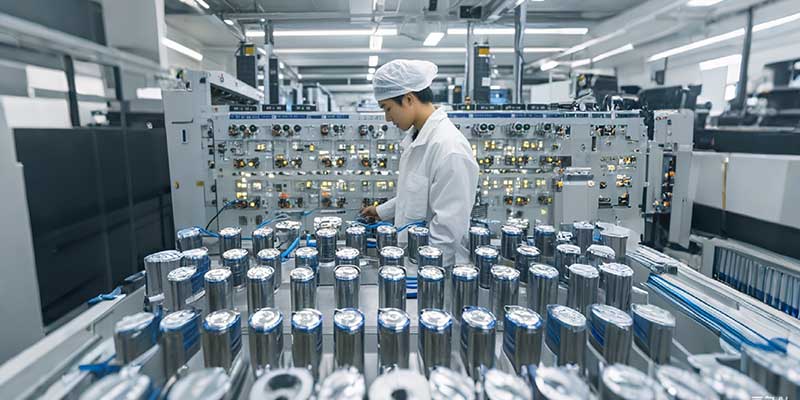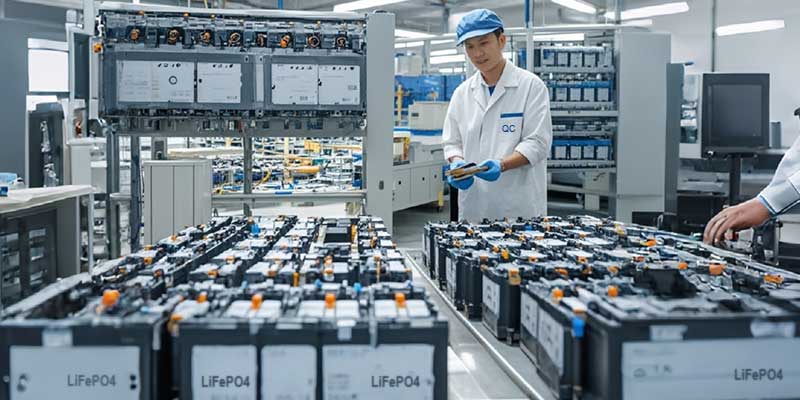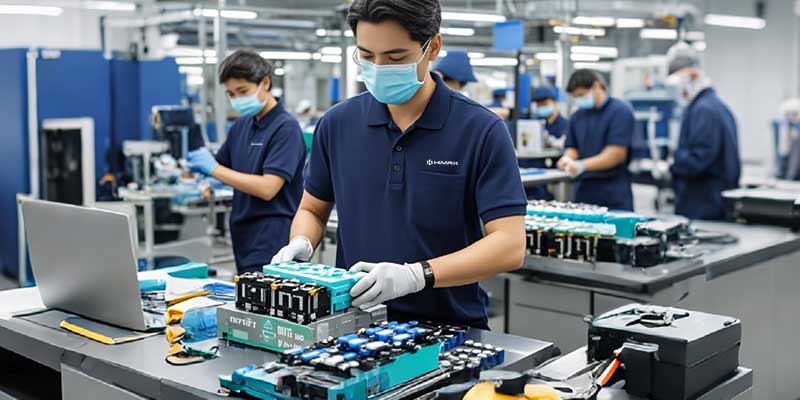How to Choose the Best Lithium-Ion Battery Vendor for Your Business
Introduction
As businesses across various industries increasingly rely on lithium-ion batteries to power everything from electric vehicles (EVs) to renewable energy storage systems, choosing the right vendor becomes critical. Selecting the best lithium-ion battery supplier not only impacts your product performance but also affects your overall operational efficiency, cost management, and customer satisfaction.
This article aims to guide you through the essential criteria for selecting the ideal lithium-ion battery vendor for your business. From product quality and technical support to pricing and industry experience, we will cover all the important factors you need to consider.
- Evaluating Product Quality
The performance and reliability of lithium-ion batteries are crucial to the success of your business, especially if your products depend on them for energy storage or powering devices. One of the first aspects to consider when choosing a vendor is the quality of the batteries they offer. High-quality batteries will result in longer product lifespans, better energy efficiency, and fewer risks of malfunctions or safety hazards.

Key Indicators of Battery Quality:
- Battery Lifespan:Assess the number of charge cycles the batteries can sustain without significant degradation.
- Energy Density:A high energy density ensures that the battery can store more energy for its size, which is especially important for compact devices or electric vehicles.
- Safety Features:Ensure that the batteries have protective features like overcharge, short-circuit, and temperature controls to prevent potential accidents.
How to Assess a Vendor’s Quality Standards:
- ISO Certifications:Vendors with certifications like ISO 9001 and ISO 14001 follow international standards for quality management and environmental responsibility.
- Factory Audits:If possible, arrange for audits of the supplier’s manufacturing facilities to ensure they adhere to strict quality control measures.
- Third-Party Testing:Independent testing of the vendor’s battery products can help verify claims about battery performance and safety.
Selecting a vendor with a strong track record of delivering high-quality batteries will give you peace of mind and protect your business from potential recalls or customer complaints.
- Technical Support and Customization Options
Businesses often require batteries that meet specific needs based on the application, and not all lithium-ion batteries are created equal. This is why having a vendor that offers technical support and customization services is crucial.
Importance of Technical Support:
- Post-Purchase Assistance:Once you start using the batteries in your products, having access to technical support can help resolve any issues related to integration, performance, or maintenance.
- Battery Optimization:Vendors with a solid technical team can help optimize battery performance for specific applications, ensuring you get the most out of each unit.
Customization Services: In some cases, off-the-shelf batteries may not meet your business needs. A good vendor should be able to provide customized battery solutions, such as adjusting battery capacity, voltage, or form factor, to align with your product specifications.
When choosing a vendor, inquire about their ability to provide custom solutions and the level of technical support they offer. This will be particularly important for businesses involved in niche markets or those developing specialized products.
- Production Capacity and Delivery Reliability
A vendor’s ability to meet your production needs consistently is another critical factor. Even the best-quality batteries won’t help if the supplier can’t deliver them on time or in the quantities you require. Reliable delivery ensures that your business operations remain uninterrupted and that your customers receive products without delays.
Evaluating Production Capacity:
- Manufacturing Scale:Check whether the vendor has the production capacity to meet both your current and future demand. This is particularly important if your business is growing or if you expect to scale production significantly.
- Lead Time:Understand the vendor’s lead times, especially for large orders. Shorter lead times often mean better supply chain management and faster response to your needs.
Delivery Reliability:
- Supply Chain Stability:Investigate whether the vendor has diversified their supply chain to avoid disruptions caused by regional issues, such as trade tariffs, pandemics, or material shortages.
- Global Distribution Capabilities:If your business operates in multiple countries, choose a vendor with a global distribution network. This ensures timely delivery regardless of where you are located.
Partnering with a vendor that can reliably meet your production schedules is essential for maintaining operational efficiency and customer satisfaction.
- Cost-Effectiveness and Price Competitiveness
Cost is a key consideration for any business, and finding a balance between cost-effectiveness and quality is critical when choosing a lithium-ion battery vendor. While the cheapest option may be appealing in the short term, poor battery performance or frequent replacements can lead to higher long-term costs.
Cost vs. Quality:
- Price Transparency:Look for vendors who provide clear and transparent pricing structures, including any additional costs such as shipping or customization fees.
- Total Cost of Ownership:When comparing vendors, consider the total cost of ownership, which includes not just the purchase price but also maintenance, warranty, and potential replacement costs over time.
Long-Term Contracts and Savings:
- Bulk Pricing:Vendors that offer discounts for bulk purchases or long-term contracts can provide significant savings over time.
- Value-Added Services:Some vendors offer value-added services such as extended warranties, technical training, or recycling programs, which can enhance cost-effectiveness.
While it’s important to stay within your budget, it’s equally important to consider the long-term value of the batteries you’re purchasing. Cheaper batteries that underperform or degrade quickly could end up costing your business more in the long run.
- Vendor’s Industry Experience and Reputation
A vendor’s experience in the lithium-ion battery industry is often a strong indicator of their reliability, expertise, and market standing. Vendors with decades of experience are more likely to have well-established processes, better product development capabilities, and the ability to anticipate and meet industry trends.
Evaluating Experience and Expertise:
- Years in the Industry:Consider how long the vendor has been operating in the lithium-ion battery space. Longevity can be a sign of reliability and industry knowledge.
- Industry Specialization:Some vendors specialize in certain applications, such as automotive batteries, industrial energy storage, or consumer electronics. Partnering with a vendor that understands your specific industry needs can lead to better product solutions.
Checking Vendor Reputation:
- Client Testimonials and Case Studies:Look for reviews, testimonials, or case studies from other businesses that have worked with the vendor. This will give you a sense of their reputation and the quality of their products and services.
- Industry Awards and Certifications:Vendors who have won industry awards or have certifications from respected organizations can be more trustworthy and reliable.
A vendor’s reputation is built over time and can provide you with confidence in their ability to meet your business needs consistently.
- Certifications and Compliance with Regulations
Compliance with international standards and certifications is a crucial factor when selecting a lithium-ion battery vendor. Depending on your industry and geographical market, specific certifications may be required to ensure the batteries are safe and meet regulatory requirements.
Common Certifications to Look For:
- UN 38.3:This certification ensures that lithium-ion batteries meet the necessary safety requirements for air transportation.
- UL Certification:Underwriters Laboratories (UL) certification is essential for ensuring that batteries meet safety standards in North America.
- CE Marking:For businesses operating in Europe, CE certification is required to ensure that products meet EU safety, health, and environmental protection standards.
- RoHS Compliance:The Restriction of Hazardous Substances (RoHS) directive restricts the use of specific hazardous materials in electrical and electronic products.
Importance of Compliance: Failure to meet the necessary certifications can result in shipment delays, fines, or even a ban on selling your products in certain regions. Ensuring that your vendor is compliant with all relevant regulations will protect your business from these risks.

Himax Electronics’ Advantage
At Himax Electronics, we understand the importance of providing high-quality, reliable lithium-ion batteries to support your business needs. With years of experience in the industry, we offer a wide range of battery products designed to meet international standards and deliver consistent performance.
Our products are known for their durability, energy efficiency, and safety features, ensuring that your business benefits from long-lasting, dependable power solutions. Whether you require customized battery designs, technical support, or bulk pricing options, Himax Electronics is equipped to deliver the best solutions tailored to your needs.
We are committed to sustainability and compliance, ensuring that all of our batteries meet key international certifications, including UN 38.3, UL, and CE. Our global supply chain network ensures timely delivery and reliable service, no matter where your business operates.
Partner with Himax Electronics to benefit from our extensive knowledge, technical expertise, and commitment to customer satisfaction. Together, we can help power your business to new heights.
Conclusion
Choosing the best lithium-ion battery vendor for your business requires a careful evaluation of multiple factors, including product quality, technical support, production capacity, cost-effectiveness, and industry reputation. By considering these key elements, you can make an informed decision that ensures your business runs smoothly and efficiently.
Remember, the right battery vendor is not just a supplier but a long-term partner who can help you navigate the evolving landscape of energy storage technology and meet your business goals.



